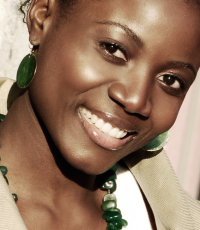The nearly perfect, colorful, traditional imageries captured in her break-through videos were beyond commanding. In inventive motions Angelique Kidjo set a tone and stage very foreign to many African women and girls at the time, releasing an enigmatic sensation that hung loose around passion better left unexplained. Behind this cinematic scene is a powerful woman who, for many years, has unreservedly demonstrated a passion for female empowerment.
“When I grew up in Benin, there was a lot of pressure on my dad not to put his girls in school. But he did it anyway and I am very grateful. It has helped me so much in my life and in my career,” Kidjo explains her intense passion for female education in Africa in an exclusive e-mail interview with Obaasema.
She adds: “When girls are around 10 years old, in many countries they are brought back home to take care of the little ones. I am hoping that we can help the family in a way that would encourage them to let their girls learn. African women are so strong and are already involved in many informal businesses. Imagine what it would be to have highly educated women involved in the development of the continent!”
In 2007, Kidjo founded a non-governmental organization based in the U.S. called The Batonga Foundation. Determined to partake in the diminution of illiteracy among girls in Africa, the organization is acting by providing secondary and higher education to girls through scholarships, granting better teaching standards, building secondary schools, encouraging mentor programs that build platforms for young girls to maintain healthy relationships with older women who serve as “protectors,” a term used by the organization. It strives to shred gender biases and traditions that deter female empowerment and educational opportunities.
“We have been able to grant scholarships to girls in five countries. It is still a limited number of girls but we have to start somewhere,” she says of what she perceives to be the organization’s biggest accomplish thus far. “I hope we will be able to pursue this effort much further.”
Equally important to this compassionate singer are advocacy projects involving the neglected, like Annie Lennox’s “Sing” project, a record created with a team of 22 other female megastars to raise money and awareness for the Treatment Action Campaign (TAC), an HIV/AIDS organization. The initiative involves creating awareness about transmission of the disease to unborn children in Africa.
“The medicine that prevents the mother from transmitting the virus to her baby is so inexpensive. Every HIV positive mother should be able to afford it. This is the fight that Annie Lennox is fighting and if my voice can be of any help, I am willing to join!”
Kidjo, who has served as a goodwill ambassador for UNICEF since July 25th 2002, is no alien to humanitarian work, and devotes a significant amount of her time to the causes of the organization.
“When I was a little girl, I was afraid of the UNICEF bus that brought vaccinations to us because I was scared of needles,” Kidjo recalls. “Now I realize that UNICEF has done so much for my health ad education. When they contacted me in 2002 after a big event at the United Nations and offered me the opportunity to be a Goodwill Ambassador, I was thrilled. My focal point has been girls’ education. I have visited many countries and met so many mothers and kids. If we are able to properly educate the new generation of African kids, the continent will change for the better. There is no doubt in my mind about it.”
As one deeply committed to children and education, she has embraced a maternal role, through charitable ventures, in a narcissistic world that often seems to neglect the youth. Young African girls today thirst for healthy guides and formidable role models, a gem found in Kidjo who exemplifies a strong passionate woman.
“When I grew up I was inspired by Miriam Makeba and a Togolese singer called Bella Bellow. Seeing that they could be successful kept my dream alive,” she states.
Even with such confidence, this tenacious singer/songwriter admits her international break-through was fruit after years of testing: “It was a slow process. I am so passionate about my music and never got discouraged. You find that a lot of people don’t believe in what you do. You have to keep on doing what you do with passion and awareness of what is going on around you musically.”
Kidjo has proven her talent to be authentic: after nine successful albums and eight awards including a Grammy she won this year for Best Contemporary World Music Album, she is back with yet another thrilling record, Djin Djin, showing no signs of slowing down.
“I first started to sing on stage when I was six years old and since then it has been my passion. I just can’t live without it,” she reveals the secret behind her vibrant successful career. “Also I can’t record the same kinds of albums over and over. Each album has to be different. This is my challenge.”
But this same challenge, again and again, happens to produce excellent records, and winning a Grammy award demonstrates the world’s acknowledgement of and appreciation for her craft. Even with this amount of success, Kidjo still stirs at the thought of winning such an award.
“I was screaming and jumping around. People from the Grammy staff thought I was crazy. I had been nominated before so I did not think I would win. It surprised me,” she recalls.
Her latest album Djin Djin features collaborations with Alicia Keys, Joss Stone, Carlos Santana, Ziggy Marley and other notable musicians, an experience she describes with a beam.
“I am so blessed to have been supported by those artists. It proves that there is a great respect for African music. When people are exposed to African music, they love it!
“Before Djin Djin, I recorded a trilogy of albums exploring the African roots of the music of the Diaspora. This time I wanted to come back home and record using the percussion players from Benin as a base for my music,” she explains the inspiration behind the album.
What words could better describe the career of this brilliant 47-year-old singer other than intense passion – from demanding humanitarian activities to her profession as a musician; strength connects them all. And the woman misses home during these periods: “I love to be home and cook but with the success of my last album, Djin Djin, I have been on the road for so long. I just wish I could spend a little more time with my family.”
And her final word to women goes: “This might be a cliché, but you have to love yourself and be proud of who you are. You should be inspired by your roots, but also accept the fact that everything around you changes!”







